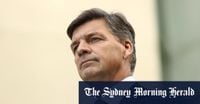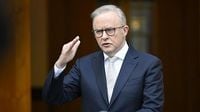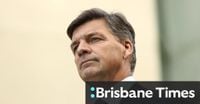As the political landscape in Australia heats up ahead of the May 3 federal election, Prime Minister Anthony Albanese has made headlines by addressing potential U.S. tariffs and outlining an ambitious healthcare initiative in Tasmania. His comments come amidst a backdrop of uncertainty regarding U.S. trade policies and ongoing debates about the future of public services in Australia.
On April 2, 2025, Albanese expressed that Australia is "prepared for all possibilities" regarding tariffs that U.S. President Donald Trump is expected to announce. Speaking in Burnie, Tasmania, the Prime Minister labeled tariffs as an act of "economic self-harm" and reiterated the importance of diversifying Australia's trading relationships. "I don’t want to pre-empt the decision that’s made by the United States in the coming period," he told reporters. "What I can say is that we’re prepared for all possibilities going forward." He noted that the U.S. represents under five percent of Australia's exports, indicating that while the impact might be limited, the broader effects on global growth could be concerning.
In addition to addressing international trade issues, Albanese unveiled plans for a comprehensive health hub in north-west Tasmania. This facility is set to provide a range of services including playgroups, family care, domestic violence support, pharmacy, pathology, general practitioners, and a Medicare mental health center. "This will be an area where people can come and go through different services as well, get advice," he stated. Albanese's focus on healthcare is part of a broader strategy to position Labor as the best choice for Australians' health needs as the election approaches.
Meanwhile, the Coalition is also ramping up its campaign efforts. Shadow Treasurer Angus Taylor announced plans to create a new statutory office called Investment Australia, aimed at streamlining investment facilitation and reducing regulatory costs. During a speech at the National Press Club, Taylor emphasized that productivity-enhancing investments are being hindered by government red tape. "Investment Australia will be backed by a legislative framework and mandate: to boost our competitiveness and to facilitate investment," he asserted. This new agency would sit within the federal Treasury and have powers to hold regulators accountable for bureaucratic delays that impede economically beneficial projects.
Taylor's proposal includes appointing a chair with strong private sector and public administration experience within 100 days of the election. He highlighted that the focus would be on key sectors such as financial services, construction, resources, and energy. The Coalition's agenda also includes a bill titled "Securing Australia as a Financial Centre," which aims to legislate reforms in the financial services sector, including regulations concerning digital assets like Bitcoin.
In a related development, Opposition Leader Peter Dutton is advocating for significant cuts to the public service, proposing to eliminate 41,000 jobs to save $7 billion annually. Critics have raised concerns that such cuts could lead to poorer service delivery and longer wait times for social services. Dutton's plans have been met with skepticism, with opponents warning that the reliance on consultants could further degrade public service quality.
As part of the Coalition's strategy to appeal to younger voters, Dutton has expressed a desire to make it easier for young Australians to enter the property market. He stated, "We think potential arrangements are in place at the moment that are too difficult for young homebuyers." This sentiment is echoed by Taylor, who has indicated that the Coalition's plans would include adjustments to the mortgage rate buffer set by the Australian Prudential Regulation Authority (APRA) during the COVID-19 pandemic.
However, the proposal to reduce the mortgage rate buffer has faced pushback from the property sector and financial regulators. Dutton and Taylor argue that reducing this buffer could alleviate financial pressures on young buyers, but Treasurer Jim Chalmers has cautioned that such moves could lead to increased debt burdens for younger Australians. Chalmers accused Dutton of planning cuts in essential services like health and education, framing the Coalition's agenda as reminiscent of U.S. approaches that prioritize efficiency over the welfare of ordinary Australians.
As both parties gear up for the election, the debate over tariffs, healthcare, and public service reform is likely to shape voters' perceptions and decisions. Albanese's focus on healthcare and diversifying trade relationships contrasts sharply with the Coalition's emphasis on reducing bureaucratic barriers and cutting public service jobs.
With the election just weeks away, the stakes are high as both sides present their visions for Australia's future. Albanese is determined to showcase Labor's commitment to healthcare and social support, while the Coalition aims to position itself as the party of economic reform and efficiency. As the political battle unfolds, Australians will need to weigh the implications of each party's platform on their daily lives and the nation's economic stability.
Ultimately, the decisions made in the coming weeks will not only impact the immediate political landscape but also shape the trajectory of Australia's economic and social policies for years to come.









